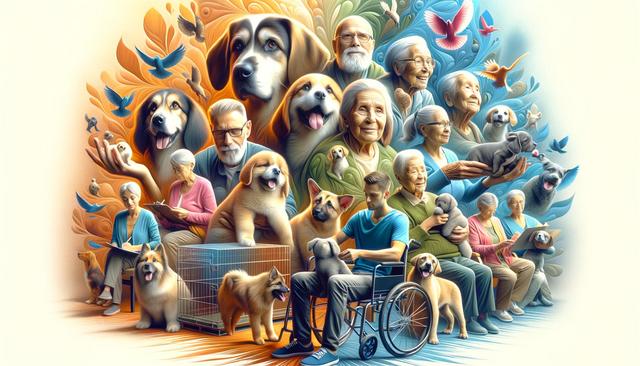The Emotional Benefits of Pet Companionship for Seniors
For many seniors, the shift into retirement or the experience of living alone can lead to feelings of isolation or loneliness. Pet adoption offers a heartwarming solution, providing companionship, routine, and a reason to stay active. The presence of a pet can have a calming effect, reducing stress and anxiety levels. Studies have shown that older adults who live with pets often report higher levels of happiness and lower rates of depression. A dog’s wagging tail or a cat’s gentle purring can offer emotional reassurance that positively impacts mental health.
Besides emotional comfort, having a pet can also create opportunities for social interaction. Whether it’s chatting with neighbors during walks or visiting the vet, these small interactions contribute to a more connected and engaged lifestyle. Many seniors find that pets become not just companions, but also conversation starters and bridges to forming new friendships.
Physical Health Advantages of Pet Ownership
Adopting a pet encourages physical activity, which is crucial for maintaining mobility and overall health in older age. Dogs, in particular, need regular walks, which naturally promotes cardiovascular exercise. Even basic pet care tasks like feeding, grooming, or cleaning up after a pet support daily movement and routine. These low-impact activities can help reduce blood pressure, improve cholesterol levels, and support weight management.
In addition to physical benefits, the sense of responsibility and structure that comes with pet care can motivate seniors to maintain a consistent daily routine. This regularity may contribute to better sleep patterns and increased energy levels. For seniors recovering from illness or surgery, the presence of a pet may even serve as a gentle, motivating force in rehabilitation efforts.
Matching the Right Pet to the Right Person
Choosing the right pet is essential to ensure a successful and sustainable adoption experience. Not all pets will be well-suited for every senior, so it’s important to consider factors such as energy levels, grooming needs, and lifespan. For example, a small, older dog might be a better match for a senior with limited mobility than a high-energy puppy. Likewise, cats or small mammals may be ideal for those who prefer lower-maintenance companions.
Key considerations when selecting a pet include:
- Size and breed temperament
- Age of the animal
- Medical needs of both the pet and the owner
- Living environment (apartment vs. house with yard)
Many shelters and pet adoption programs offer assistance in making these matches, often with trial periods or foster-to-adopt opportunities. This ensures that both the senior and the pet are comfortable and happy with their new arrangement.
Pet Adoption Programs Tailored for Seniors
Recognizing the unique needs of older adults, some organizations have developed pet adoption programs specifically for seniors. These initiatives often offer reduced adoption fees, provide senior animals (which may be calmer and already trained), and include follow-up support. Such programs aim to empower seniors by removing barriers to pet ownership and reinforcing the value of companionship in later life.
Common features of senior-focused pet adoption programs may include:
- Home visits to ensure safe environments
- Veterinary care assistance or discounts
- Education on pet care for older adults
- Ongoing community support and social events
These programs not only facilitate the adoption process but also build a sense of community among participants. Seniors often benefit from shared experiences, whether it’s through group training sessions or pet-friendly meetups, creating a network of support and shared joy.
Preparing for a Fulfilling Pet Adoption Journey
Before committing to pet adoption, seniors should take time to assess their lifestyle, health, and long-term plans. While pets bring joy, they also require commitment. Planning ahead ensures that both the pet and the new owner will enjoy a positive and stable relationship. It’s beneficial to involve family members or caregivers in the decision-making process, especially to discuss contingencies in case of future health changes.
Preparation steps might include:
- Visiting local shelters to interact with various animals
- Talking to adoption counselors about specific needs
- Budgeting for pet care expenses
- Arranging for backup care support if needed
Taking these steps helps build confidence and sets the stage for a rewarding experience. Adopting a pet is not just about filling a home; it’s about enriching life, creating routines, and forming bonds that offer comfort, joy, and companionship every day.
Conclusion: Enhancing Senior Wellbeing Through Pet Adoption
Pet adoption can be a transformative experience for seniors, offering emotional, physical, and social benefits that enhance quality of life. By choosing the right pet and taking advantage of supportive adoption programs, older adults can enjoy meaningful companionship and renewed purpose. Empowering seniors through pet adoption is more than just placing animals in homes—it’s about creating lasting, positive connections that improve wellbeing for both pets and people alike.




Leave a Reply